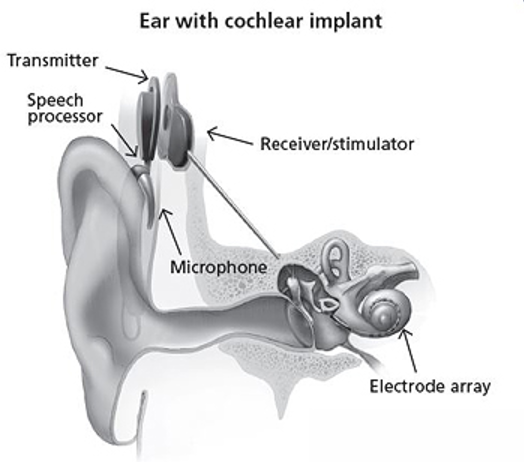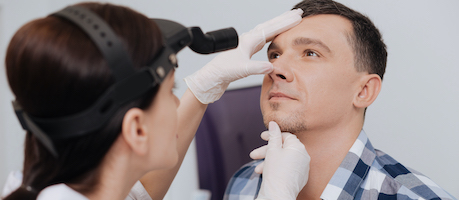Since 1984, cochlear implants have been used to facilitate hearing by directly stimulating the auditory nerve, bypassing damaged inner ear hair cells. In the past 28 years, cochlear implant technology has been provided to over 200,000 patients worldwide.
In conjunction with Inova Fairfax Hospital, Otolaryngology Associates is the first practice to offer cochlear implantation as a hearing solution to the Fairfax area. Additionally, the practice is one of few in the area to offer the latest Cochlear Implant technology from all three FDA-approved manufacturers: Advanced Bionics, Cochlear Americas & Med-EL, giving you the choice.
What are cochlear implants?
A cochlear implant is an electronic device that can provide sound awareness to people who have severe to profound hearing loss. It uses electrical pulses to stimulate the hearing nerve, bypassing damage to the cochlea.
How do cochlear implants work?
Microphones on the external sound processor pick up sounds from the environment. These sounds are coded in the sound processor and sent to the internal device using RF signals. The internal receiver/stimulator then converts the signal to electrical pulses. The electrodes in the cochlea stimulate the hearing nerve, which sends the signal up to the brain to be processed as sound.Cochlear implants are not the same as hearing aids - they do not amplify sound to overcome damage in the inner ear. Instead, they bypass the damaged inner ear to stimulate the auditory nerve directly.
Candidacy
Our team of audiologists and ENT physicians will work together to decide whether you are a candidate for a cochlear implant. You will have several visits for various kinds of testing in order to determine whether you can undergo the surgery. Here are some general guidelines about who is a candidate: Children
Children
- 1 year and older
- Severe to profound sensorineural hearing loss
- <30% correct on age-appropriate speech understanding tasks or lack of progress in auditory skill development
- Use of hearing aids for at least 3-6 months
 Adults
Adults
- Moderate to profound sensorineural hearing loss
- <50% correct on speech understanding tasks
If you have less severe hearing loss, you may still be a candidate if you fall into one of the following categories:
 Hybrid/EAS
Hybrid/EAS
- Severe to profound high-frequency sensorineural hearing loss
- Mild to moderate low-frequency sensorineural hearing loss
- <60% correct on speech understanding tasks
 SSD/Unilateral Hearing Loss
SSD/Unilateral Hearing Loss
- Profound hearing loss in the ear to be implanted
- <5% correct on speech understanding tasks in the ear to be implanted
- Normal hearing to moderate hearing loss in opposite ear
- At least one month experience using CROS, hearing aids, or a similar system
All candidates must also meet the following criteria:
- Ability to undergo surgery with general anesthesia
- Ability to attend all pre-surgery and post-surgery appointments
- Willingness to participate in aural rehabilitation program
Cochlear implant surgery
All cochlear implant surgeries are performed at Inova Fairfax Hospital. The surgery lasts 2-3 hours and is performed under general anesthesia. Some patients may stay in the hospital overnight for observation, but most patients can go home the same day.Initial activation and follow-up
Initial activation of the cochlear implant takes place approximately 4 weeks after surgery. At that appointment, the audiologist will check to make sure the device is functioning properly and will do tests to determine how much stimulation to provide to the hearing nerve. Most patients will be able to detect sound following this appointment, but many patients report that environmental sounds and voices do not sound normal.Following initial activation, between 5 and 7 programming visits will be scheduled in order to continue to fine-tune the cochlear implant as the brain adapts to electrical stimulation. After these visits, most patients return 1-2 times per year for monitoring of their devices and their performance.
Aural rehabilitation
Many patients benefit from aural rehabilitation, or exercises to help the brain adapt to the new sound. Many children will receive aural habilitation by a specially trained speech-language pathologist or deaf educator. Most adults perform aural rehabilitation exercises independently at home. The audiologist will provide a list of resources at the activation appointment.Services for children with cochlear implants
Otolaryngology Associates has a special partnership with The River School, a school in Washington, DC, that is dedicated to teaching children from 18 months through Grade 3 with hearing loss in an inclusive environment. Their unique co-teaching model pairs a master’s level educator with a speech-language pathologist in each classroom.The River School provides aural rehabilitation services through their partner organization, Chattering Children. Chattering Children also provides occupational therapy, psycho-educational assessments, educational supports, speech-language therapy and other services.
The River School also provides parent-infant programs located in Washington, DC, and in Fairfax, VA. This program is a free resource for families of children diagnosed with hearing loss, ages birth to three. Parents, along with their infants and toddlers, meet each week at The River School for an hour and a half. A pilot program for families in Northern Virginia meets each month at the Fairfax City Library. Parents learn about issues relating to hearing loss and share experiences with other families in similar situations, while the children engage in fun, language-stimulating activities.
Insurance coverage
Coverage for cochlear implants is determined by each specific insurance policy. Coverage varies for every patient’s insurance plan. A prior authorization may be obtained before surgery; however, it is the patient’s responsibility to know their insurance coverage and if they need a referral prior to evaluation and programming visits.
Where can I find more information?
Manufacturers:Advanced Bionics
Cochlear
Med El
Information for patients:
American Cochlear Implant Alliance
National Institute on Deafness and Other Communication Disorders (NIDCD)
Northern Virginia Resource Center for the Deaf and Hard of Hearing
Information for families:
River School and Chattering Children
River School Parent/Infant Program
Virginia Hands and Voices
Northern Virginia Cued Speech Association



